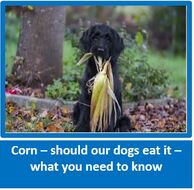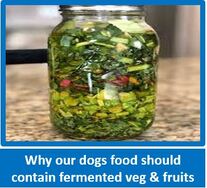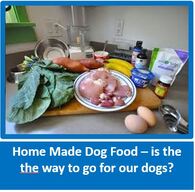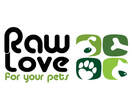
Help your dog avoid Anal Gland problems by feeding them with Raw Love Pet Food. All free-range proteins, no grains, no preservatives. We get the veggies, fruit & supplements from the same shops & farms where we buy our own supplies, including health shops and organic outlets. There are so many benefits to feeding your pups & dogs a diet of fresh, raw food – most important being a healthy immune system. A raw diet also assists with multiple health challenges, including allergies, dry & itchy skin, digestive problems, obesity, constipation and many more – plus it is what dogs were designed to eat – brilliant to give your pup a wonderful start in life. Registered with Dept of Health. Available in Gauteng, Cape Town & Surrounds and KZN. Do have a look at our website at www.rawlovepets.co.za and contact us if you have any questions.
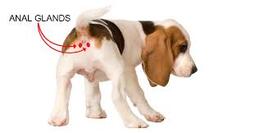
Anal glands are little sacs that sit right inside of dogs’ rectums and are designed to secrete a substance that contains pheromones. These pheromones are chemical messengers that help identify “who’s who” in the pack.
Dogs have existed in harmony with their anal glands for thousands of years. So the question is, why now do they have anal gland issues?
During the ‘40s and ‘50s -and even in some “old school” grooming schools today- groomers were taught to express the anal glands as a courtesy to the owners.
This unnecessary trauma to anal glands has become the number one reason for recurrent problems. Soft tissue trauma caused by expressing your dog’s anal glands causes the ducts swell shut, trapping the pheromone-rich substance that your dog needs to secrete on a regular basis. Imagine secreting your own tear glands on a regular basis and causing soft tissue trauma that in turn causes your tear ducts to swell shut. How painful would it be when tears build up (due to emotion or dryness) and you need to shed them? Incredibly painful and uncomfortable!
When your dog defecates the colon expands and the anal glands are naturally expressed. So why do so many dogs have anal glad issues if they should be expressing them every time they defecate?
The most common reason for anal glad issues is an improper diet. Your dog’s anal glands do not empty easily if their diet produces soft stools. Commercial dog food results in very soft stools. To combat this, many veterinarians recommend a high fiber diet to help firm up soft stools, but a diet that includes bone content is a far better solution.
When dogs are fed a raw diet that includes proper bone percentages the stools from this species appropriate diet are small and firm. These firm stools are very effective at pushing against the anal glands during elimination, causing regular emptying of the gland contents.
The second major reason for recurrent anal gland issues is inflammation of the GI tract. Because the rectum in the anus is the last part of the gastrointestinal tract, any underlying disease that influences the gastrointestinal tract can also influence the anal glands.
Once again, diet comes in to play. GI issues start in the gut. Feeding an inappropriate diet of processed food causes poor gut health which translates into many issues within the digestive tract.
NOTE: If there is an underlying inflammatory condition or low-grade infection that is already present in the anal gland, sometimes gentle manipulation by a veterinarian who’s capable of recognizing how much pressure to apply can be helpful.
Dogs have existed in harmony with their anal glands for thousands of years. So the question is, why now do they have anal gland issues?
During the ‘40s and ‘50s -and even in some “old school” grooming schools today- groomers were taught to express the anal glands as a courtesy to the owners.
This unnecessary trauma to anal glands has become the number one reason for recurrent problems. Soft tissue trauma caused by expressing your dog’s anal glands causes the ducts swell shut, trapping the pheromone-rich substance that your dog needs to secrete on a regular basis. Imagine secreting your own tear glands on a regular basis and causing soft tissue trauma that in turn causes your tear ducts to swell shut. How painful would it be when tears build up (due to emotion or dryness) and you need to shed them? Incredibly painful and uncomfortable!
When your dog defecates the colon expands and the anal glands are naturally expressed. So why do so many dogs have anal glad issues if they should be expressing them every time they defecate?
The most common reason for anal glad issues is an improper diet. Your dog’s anal glands do not empty easily if their diet produces soft stools. Commercial dog food results in very soft stools. To combat this, many veterinarians recommend a high fiber diet to help firm up soft stools, but a diet that includes bone content is a far better solution.
When dogs are fed a raw diet that includes proper bone percentages the stools from this species appropriate diet are small and firm. These firm stools are very effective at pushing against the anal glands during elimination, causing regular emptying of the gland contents.
The second major reason for recurrent anal gland issues is inflammation of the GI tract. Because the rectum in the anus is the last part of the gastrointestinal tract, any underlying disease that influences the gastrointestinal tract can also influence the anal glands.
Once again, diet comes in to play. GI issues start in the gut. Feeding an inappropriate diet of processed food causes poor gut health which translates into many issues within the digestive tract.
NOTE: If there is an underlying inflammatory condition or low-grade infection that is already present in the anal gland, sometimes gentle manipulation by a veterinarian who’s capable of recognizing how much pressure to apply can be helpful.
|
|


